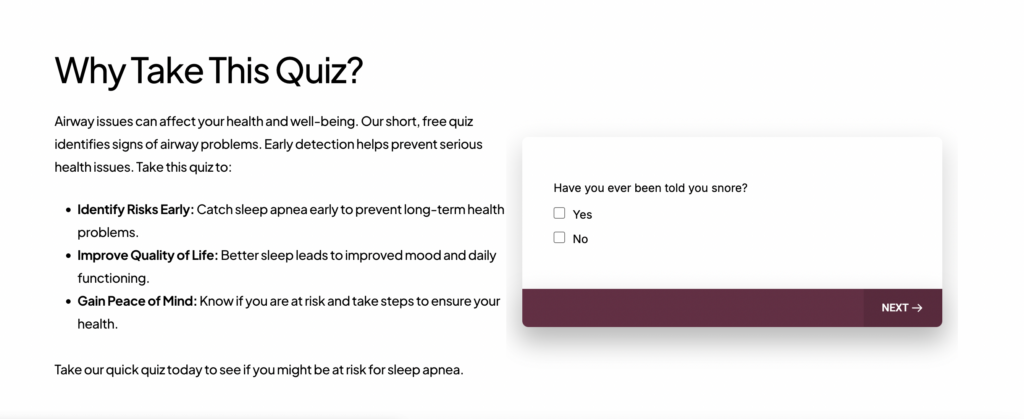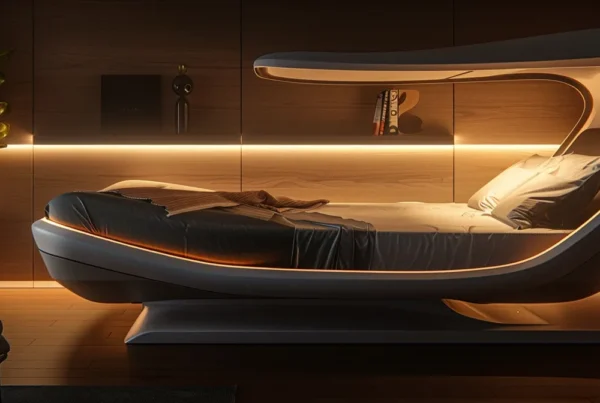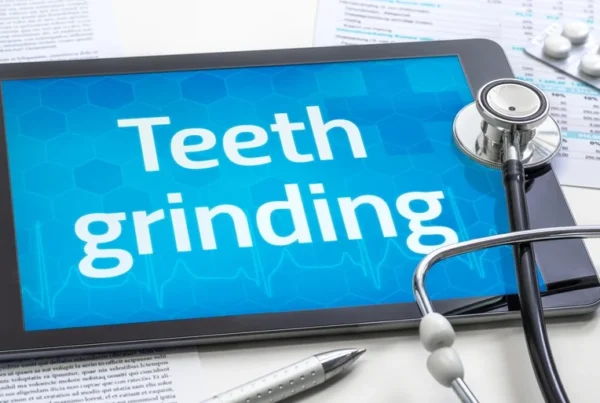When it comes to sleep apnea treatments in Hartford CT, how do you know which one to choose? Dr. Brenner will help guide you, keep reading!
Do you wake up feeling drained, even after a full night’s sleep? Or perhaps your snoring has become a nightly disturbance for your family? Many people don’t realize they’re struggling with sleep apnea, a condition that disrupts both sleep and overall health. It’s more than just lost rest—it can impact your job performance, relationships, and emotional well-being.
If you’re in Hartford, CT, there are a range of effective treatments for sleep apnea, from traditional CPAP machines to advanced solutions like the Vivos system. Dr. Bethaney Brenner offers customized options to help you reclaim restful nights and enjoy better health. Here’s a quick look at what we’ll cover:
- What sleep apnea is and why it matters
- Common treatment options and their benefits
- Why Vivos could be a transformative solution
- Steps to start your treatment journey with Dr. Brenner in Hartford, CT
Types of Sleep Apnea
Sleep apnea is a sleep disorder where breathing repeatedly stops and starts during the night, causing frequent wake-ups and poor-quality rest. The three main types of sleep apnea are:
- Obstructive Sleep Apnea (OSA): Caused by a physical blockage, usually when throat muscles relax.
- Central Sleep Apnea: Occurs when the brain doesn’t properly signal muscles to control breathing.
- Complex Sleep Apnea Syndrome: A combination of both OSA and central sleep apnea.
Symptoms often include loud snoring, waking up gasping for air, morning headaches, and ongoing tiredness. Untreated sleep apnea can lead to serious health risks like high blood pressure, heart issues, stroke, and diabetes.
Sleep apnea doesn’t just affect physical health. It impacts mood, relationships, and productivity. Those suffering from sleep apnea might notice they’re more irritable, fatigued, and less able to focus, all of which can strain daily interactions with family, friends, and colleagues.
Are You at Risk For Sleep Apnea? Take Our Quiz!
The Risks of Ignoring Sleep Apnea
Leaving sleep apnea untreated can lead to significant health challenges. Here’s a look at some potential risks:
- Heart Problems: People with untreated sleep apnea are more prone to heart attacks, irregular heart rhythms, and heart failure.
- High Blood Pressure: The frequent pauses in breathing during sleep can raise blood pressure levels, straining the heart.
- Stroke: Those with untreated sleep apnea are at a much higher risk of stroke.
- Diabetes: Sleep apnea has been linked to insulin resistance, increasing the likelihood of developing type 2 diabetes.
- Persistent Fatigue: Constant tiredness can impact productivity and elevate accident risks.
- Liver Conditions: Sleep apnea is linked to the development of nonalcoholic fatty liver disease.
- Mental Health Impacts: Mood disorders, such as anxiety and depression, can worsen over time.
Ignoring sleep apnea can take a toll on family dynamics too. Partners and family members may experience sleep disruptions, leading to a home filled with frustration and fatigue.
Exploring Sleep Apnea Treatments: Which Is Right for You?
Addressing sleep apnea can transform both nights and days. Here are some common treatments in Hartford CT:
CPAP (Continuous Positive Airway Pressure):
This machine keeps the airway open by delivering a continuous flow of air through a mask.
- Pros: Effective, works immediately.
- Cons: Many find the mask uncomfortable, and the device requires maintenance.
Mandibular Advancement Devices:
Similar to a mouthguard, this custom device shifts the jaw forward, helping to keep the airway open.
- Pros: Comfortable, non-intrusive, easy to use.
- Cons: May be less effective for severe cases; possible jaw discomfort.
Inspire Sleep:
This implantable device stimulates airway muscles to keep them open, functioning similarly to a pacemaker.
- Pros: No mask required, controlled via a remote.
- Cons: Involves surgery and can be expensive.
Surgery:
Various surgical options can address structural issues by removing excess tissue, repositioning the jaw, or adding supportive devices.
- Pros: Can offer a long-term solution for severe cases.
- Cons: Surgery is invasive, with a longer recovery period.
Lifestyle Adjustments:
Weight loss, reducing alcohol intake, and changing sleep positions can help manage symptoms.
- Pros: Promotes overall health and well-being.
- Cons: May not be effective on their own for severe cases.
Vivos System:
This oral appliance gradually reshapes the airway, addressing the root cause of sleep apnea. Unlike CPAP, which is a lifelong commitment, Vivos treatment typically takes 12-24 months and may provide long-term relief.
- Pros: Comfortable, non-invasive, treats the cause rather than just the symptoms.
- Cons: Results take time and require consistency.
Dr. Brenner offers these sleep apnea treatments in Hartford, with Vivos standing out as an innovative approach to providing lasting results.

Dr. Brenner’s Personalized Approach to Sleep Apnea
Choosing the right treatment often means working with the right provider. Dr. Bethaney Brenner offers sleep apnea solutions tailored to each person’s unique needs. She provides everything from custom-made oral appliances to advanced treatments like the Vivos system, ensuring you receive the best care possible.
Dr. Brenner collaborates closely with each patient to select the treatment most likely to improve their quality of life. She is committed to helping you achieve restful nights and better overall health.
Why Dr. Brenner Stands Out
With over two decades of experience, Dr. Bethaney Brenner is a trusted provider in Hartford, CT. Her expertise, coupled with her compassionate approach, ensures patients receive personalized care that fits their needs.
Dr. Brenner’s dedication to continuous learning keeps her at the forefront of dental and sleep apnea treatments. Her patients appreciate her attentiveness, which includes in-depth consultations to understand specific challenges before crafting a customized plan. Her collaborative approach also extends to working with other healthcare providers, enhancing the effectiveness of treatments like the Vivos system.
Choosing Dr. Brenner is a step toward better sleep, improved health, and a brighter future.
Why See a Dentist for Sleep Apnea?
It might seem surprising to consult a dentist for sleep apnea, but it’s actually a smart choice. Dentists have specialized knowledge of the mouth, throat, and jaw—key areas connected to sleep apnea symptoms.
- Specialized Knowledge: Dentists like Dr. Brenner are trained in dental sleep medicine, equipping them to detect signs of sleep apnea early, like small jaw structures or enlarged tissues.
- Custom Appliances: Dentists offer custom-fitted oral appliances that reposition the jaw and tongue, keeping the airway open—perfect for those with mild to moderate sleep apnea.
- Holistic, Collaborative Care: Dentists work with sleep specialists and other healthcare providers, giving patients a thorough and coordinated treatment plan.
- Non-Invasive Options: With innovative solutions like the Vivos system, dentists can target the root cause of sleep apnea, making it possible to improve airflow and offer lasting relief.
Working with a dentist for sleep apnea treatment means benefiting from specialized skills and a focus on long-term solutions that address both sleep quality and dental health.
Start Your Journey to Better Sleep Today
Dr. Brenner recognize how sleep apnea can impact your life. We’re here to help you reclaim restful nights and enjoy better health. Dr. Brenner’s expertise in the Vivos system and other sleep apnea treatments ensures you’ll receive customized, effective care.
Here’s how we support you:
- Comprehensive Evaluation: We assess your symptoms and evaluate your airway health.
- Personalized Treatment Plan: We create a tailored plan focused on improving your sleep quality.
- Ongoing Support: Our team provides guidance every step of the way.
Don’t let sleep apnea control your life. Schedule a consultation with Dr. Brenner today and start your journey to better sleep and health. Visit our website to see how we can help you breathe easier and feel your best. With Dr. Bethaney Brenner DMD, you’re not just a patient—you’re part of our family.
Schedule a consultation Today!
Book Your Consultation Today!
Dr. Bethaney B. Brenner DMD
8 Milford St, Burlington, CT 06013
Driving Directions
(860) 673-7155
Dr. Brenner proudly serves:
Burlington CT, Hartford CT, Harwinton CT, Bristol CT, Thomaston CT, Torrington CT, Canton CT, Avon CT, Plainville CT and Farmington CT.
Question & Answers About Sleep Apnea
What age should a child be evaluated for sleep apnea?
It’s best to evaluate children showing signs of sleep apnea by age three. Early intervention can prevent long-term issues.
Can sleep apnea cause bedwetting in children?
Yes, pediatric sleep apnea can disrupt sleep cycles, potentially leading to bedwetting. Addressing the sleep disorder might help reduce accidents.
How do I know if my snoring is a sign of sleep apnea?
If your snoring is loud and disruptive, followed by gasping or choking sounds during sleep, it may indicate sleep apnea. Consult a doctor for evaluation.
Are there lifestyle changes that can help reduce sleep apnea symptoms?
Absolutely! Maintaining a healthy weight, avoiding alcohol, and sleeping on your side can significantly reduce symptoms.
Can adults outgrow sleep apnea?
While many children outgrow sleep apnea, adults usually do not. However, weight loss and lifestyle changes can help manage the condition.
How can I support my partner who has sleep apnea?
Encourage them to seek treatment, participate in discussions about their care, and support lifestyle changes that promote better sleep.
Is sleep apnea treatment covered by insurance?
Many insurance plans cover sleep apnea treatments in Hartford CT, but it’s best to check with your provider for specific coverage details.
What should I expect during a sleep study?
During a sleep study, you’ll be monitored while you sleep. Sensors will track your breathing patterns, heart rate, and other vital signs.
How often should I follow up with my doctor after starting treatment?
Follow-ups are typically scheduled every few months to monitor progress and adjust treatment as needed.
What are the long-term effects of untreated sleep apnea?
Untreated sleep apnea can lead to serious health issues, including heart disease, high blood pressure, and increased risk of stroke.







